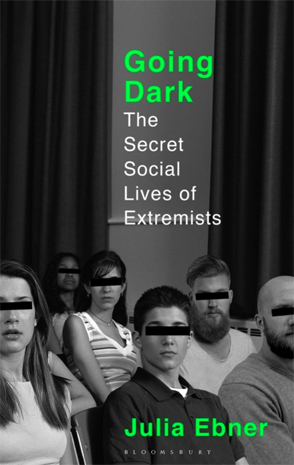Author: Julia Ebner
ISBN No: 9781526616784
Review date: 25/04/2024
No of pages: 368
Publisher: Bloomsbury
Publisher URL:
https://www.bloomsbury.com/uk/going-dark-9781526616784/
Year of publication: 02/03/2020
Brief:
It made for an intriguing book; besides a necessary piece of work, if she were to get to the bottom of what was after all her day job. Namely, working for the London-based Institute for Strategic Dialogue (ISD). It tracks and analyses harmful online content, and advises governments and tech firms on what to do about it.
But, the author of Going Dark, Julia Ebner, realised, ‘that a feline view of the cat and mouse game, between those who try to disrupt and destabilise our democracies and those who seek to protect them, is not enough to answer the most important questions’. Such as; how do the extreme fringes – whether the alt-right in the United States and indeed the western world, ISIS jihadists, conspiracy theorists, misogynists – recruit, and keep those they recruit? What do they hope to achieve, or is it all talk, albeit including some nasty and intimidatory trolling? The murder of MP Jo Cox, the public rallies and shows of strength, suggest it is more than talk.
Hence Julia went undercover for two years, adopting five identities, and joining a dozen ‘tech-savvy extremist groups across the ideological spectrum – from jihadists and Christian fundamentalists to white nationalists, conspiracy theorists and radical misogynists’. As she put it, by day she was working as a cat; ‘but in my spare time I joined the mice’.
She says that the abhorrent content she came across was sobering, ‘and the number of young people involved saddening’. For there – as with fascist movements and indeed communism between the world wars – is the problem; Julia Ebner sees again ‘a toxic combination of ideological nostalgia and technological futurism that might determine the direction of travel for 21st century politics’. Extremists are using tech to appeal to the young, angry and tech-savvy, and ‘they have the potential to become a dangerous force for change’.
As she makes clear, the new extremists are loosely organised – indeed, there lies the benefit of the online world, that the like-minded anywhere can link up, without having to physically post an application form, receive a newsletter every so often through the mail, travel to a meeting or rally to wave a flag. She shows the ‘group dynamics’ that attracts people ‘vulnerable to the rhetoric of the extreme right’. More tech, and new law and policy alone, won’t fight the allure and impact of these extremists, she shows. She argues for ‘a holistic, longer-term approach’, across political parties. As that implies, misanthropic and anti-democratic ideologies are only spreading.
While this book will be of particular use to campus security managers, to understand what may pop up on campus or what is bubbling in chatrooms; in truth it is a book of interest for all democrats. It makes a neat fit with The Fifth Domain, recently reviewed, about cyber-security.
Visit also the ISD website for publications on France, Germany and the UK, such as ISD’s comments to UK Government on the proposed ‘online harms’ law.










